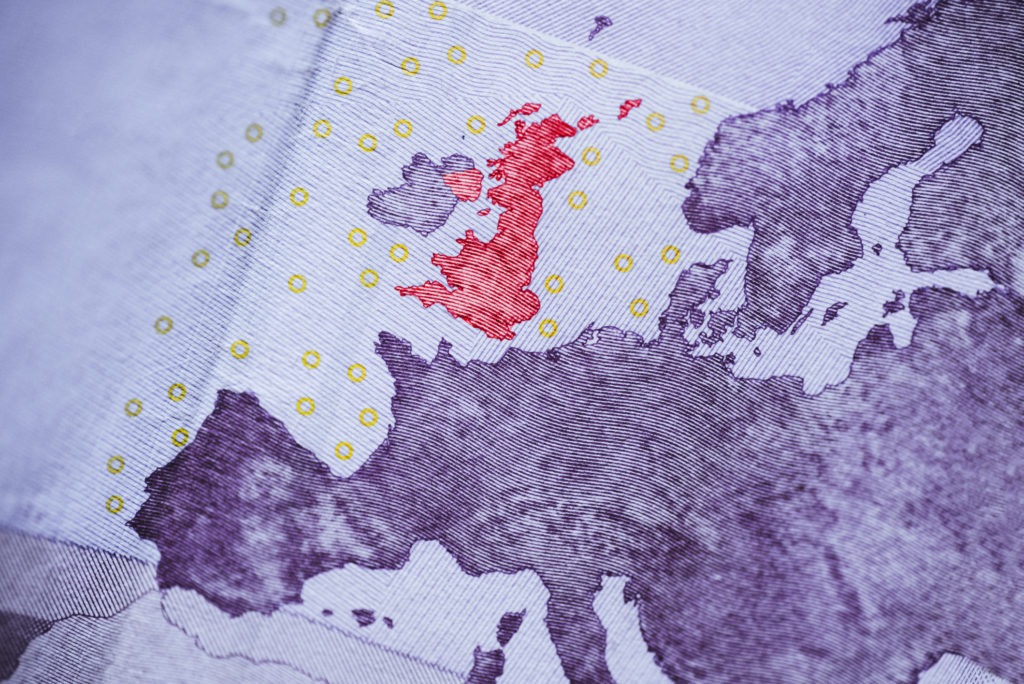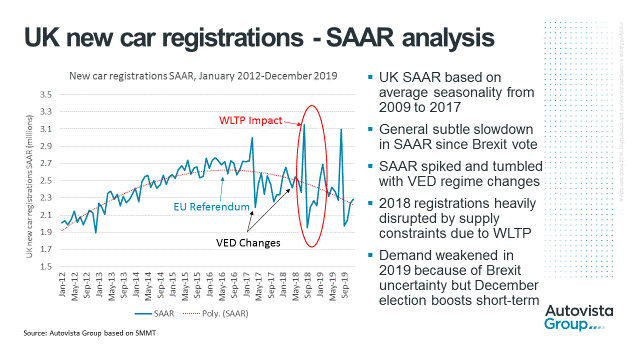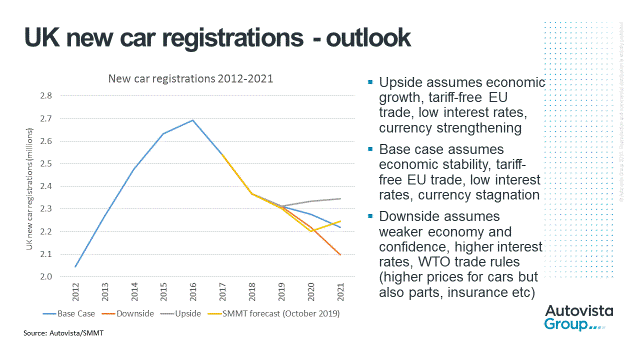Uncertainty continues in UK despite December new-car market rally
06 January 2020

6 January 2020
Autovista Group’s senior data journalist Neil King has calculated that the seasonally-adjusted annualised rate (SAAR) of the UK new-car market improved for the third consecutive month in December, to almost 2.3 million registrations. However, it remains lower than in the first half of 2019, when the selling rate averaged closer to 2.5 million registrations.
′The December result was at the level of Autovista Group’s upside scenario forecast for the month of December as the election of the new majority government has removed some uncertainty surrounding Brexit, at least in the short term,’ said King.
 Source: Autovista Group based on SMMT data
Uncertain trading future clouds outlook
Despite the healthier result in December, the forecast for 2020 is unchanged and Autovista Group still expects a 1.5% decline in new-car registrations. However, although the withdrawal of the UK from the EU at the end of January is now expected to proceed unhindered, the terms of the UK’s future trading relationship with the EU remain uncertain.
A no-deal scenario may yet materialise this year and in this case, the impact on the new-car market would be more severe. The downside forecast calls for a 4.0% drop in 2020 and a further decline of 5.5% in 2021. However, if a deal is negotiated that secures ongoing free trade between the UK and the EU after the transition phase ends on 31 December 2020, modest growth of 1.0% and 0.5% is anticipated in 2020 and 2021 respectively, explained King.
Source: Autovista Group based on SMMT data
Uncertain trading future clouds outlook
Despite the healthier result in December, the forecast for 2020 is unchanged and Autovista Group still expects a 1.5% decline in new-car registrations. However, although the withdrawal of the UK from the EU at the end of January is now expected to proceed unhindered, the terms of the UK’s future trading relationship with the EU remain uncertain.
A no-deal scenario may yet materialise this year and in this case, the impact on the new-car market would be more severe. The downside forecast calls for a 4.0% drop in 2020 and a further decline of 5.5% in 2021. However, if a deal is negotiated that secures ongoing free trade between the UK and the EU after the transition phase ends on 31 December 2020, modest growth of 1.0% and 0.5% is anticipated in 2020 and 2021 respectively, explained King.
 Source: Autovista Group/SMMT
Six-year low
New car registrations in the UK rose by 3.4% year-on-year in December, according to the latest data released today by the Society of Motor Manufacturers and Traders (SMMT). This was the strongest monthly growth in 2019 but was bolstered by an additional working day compared to December 2018 and also follows a 5.5% year-on-year decline in demand in that month as the new WLTP emissions regulations continued to disrupt supply. Nevertheless, new car registrations still fell by 2.4% in the year as a whole.
Mike Hawes, SMMT Chief Executive, said, ′A third year of decline for the UK new-car market is a significant concern for industry and the wider economy. Political and economic uncertainty, and confusing messages on clean-air zones have taken their toll on buyer confidence, with demand for new cars at a six-year low.’
Hawes added that a stalling market will hinder industry’s ability to meet stringent new CO2 targets and, importantly, undermine wider environmental goals.
′We urgently need more supportive policies: investment in infrastructure; broader measures to encourage uptake of the latest, low and zero-emission cars; and long-term purchase incentives to put the UK at the forefront of this technological shift. Industry is playing its part with a raft of exciting new models in 2020 and compelling offers but consumers will only respond if economic confidence is strong and the technology affordable.’
Private demand falls, BEVs surge
The annual decline was driven primarily by falling private demand, with registrations down 3.2%, although the low-volume business market also fell, down 34.4%. Fleet registrations, meanwhile, remained broadly stable, up 0.8%. Demand fell across nearly all vehicle segments, with only the dual-purpose and specialist-sports categories experiencing growth, up 12.0% and 19.2% respectively. Despite registrations of superminis and lower medium cars falling (by 6.0% and 4.0% respectively), these smaller vehicles remain the most popular – with a combined 57.1% market share.
There was modest growth in demand for petrol cars, up 2.2%. However, this was not enough to offset the significant 21.8% decline in diesel registrations. December marked the 33rd month of diesel decline, as continued anti-diesel rhetoric and confusion over clean-air zones hit demand. This has resulted in drivers keeping their older, more polluting vehicles on the road for longer, the SMMT commented.
Bucking the overall trend, combined alternatively-fuelled vehicle (AFV) registrations surged in 2019 to take a record 7.4% market share. Hybrid-electric vehicles (HEVs) continued to dominate this sector, with registrations increasing 17.1% to 97,850 units. Battery-electric vehicle (BEV) registrations experienced the biggest percentage growth, rising 144.0% to 37,850 units and overtaking plug-in hybrids for the first time.
While the huge increase in BEV demand is welcome, their 1.6% market share is still tiny and underlines the progress needed to reach the 50-70% share the UK Government envisages in the next 10 years.
Source: Autovista Group/SMMT
Six-year low
New car registrations in the UK rose by 3.4% year-on-year in December, according to the latest data released today by the Society of Motor Manufacturers and Traders (SMMT). This was the strongest monthly growth in 2019 but was bolstered by an additional working day compared to December 2018 and also follows a 5.5% year-on-year decline in demand in that month as the new WLTP emissions regulations continued to disrupt supply. Nevertheless, new car registrations still fell by 2.4% in the year as a whole.
Mike Hawes, SMMT Chief Executive, said, ′A third year of decline for the UK new-car market is a significant concern for industry and the wider economy. Political and economic uncertainty, and confusing messages on clean-air zones have taken their toll on buyer confidence, with demand for new cars at a six-year low.’
Hawes added that a stalling market will hinder industry’s ability to meet stringent new CO2 targets and, importantly, undermine wider environmental goals.
′We urgently need more supportive policies: investment in infrastructure; broader measures to encourage uptake of the latest, low and zero-emission cars; and long-term purchase incentives to put the UK at the forefront of this technological shift. Industry is playing its part with a raft of exciting new models in 2020 and compelling offers but consumers will only respond if economic confidence is strong and the technology affordable.’
Private demand falls, BEVs surge
The annual decline was driven primarily by falling private demand, with registrations down 3.2%, although the low-volume business market also fell, down 34.4%. Fleet registrations, meanwhile, remained broadly stable, up 0.8%. Demand fell across nearly all vehicle segments, with only the dual-purpose and specialist-sports categories experiencing growth, up 12.0% and 19.2% respectively. Despite registrations of superminis and lower medium cars falling (by 6.0% and 4.0% respectively), these smaller vehicles remain the most popular – with a combined 57.1% market share.
There was modest growth in demand for petrol cars, up 2.2%. However, this was not enough to offset the significant 21.8% decline in diesel registrations. December marked the 33rd month of diesel decline, as continued anti-diesel rhetoric and confusion over clean-air zones hit demand. This has resulted in drivers keeping their older, more polluting vehicles on the road for longer, the SMMT commented.
Bucking the overall trend, combined alternatively-fuelled vehicle (AFV) registrations surged in 2019 to take a record 7.4% market share. Hybrid-electric vehicles (HEVs) continued to dominate this sector, with registrations increasing 17.1% to 97,850 units. Battery-electric vehicle (BEV) registrations experienced the biggest percentage growth, rising 144.0% to 37,850 units and overtaking plug-in hybrids for the first time.
While the huge increase in BEV demand is welcome, their 1.6% market share is still tiny and underlines the progress needed to reach the 50-70% share the UK Government envisages in the next 10 years.
 Source: Autovista Group based on SMMT data
Uncertain trading future clouds outlook
Despite the healthier result in December, the forecast for 2020 is unchanged and Autovista Group still expects a 1.5% decline in new-car registrations. However, although the withdrawal of the UK from the EU at the end of January is now expected to proceed unhindered, the terms of the UK’s future trading relationship with the EU remain uncertain.
A no-deal scenario may yet materialise this year and in this case, the impact on the new-car market would be more severe. The downside forecast calls for a 4.0% drop in 2020 and a further decline of 5.5% in 2021. However, if a deal is negotiated that secures ongoing free trade between the UK and the EU after the transition phase ends on 31 December 2020, modest growth of 1.0% and 0.5% is anticipated in 2020 and 2021 respectively, explained King.
Source: Autovista Group based on SMMT data
Uncertain trading future clouds outlook
Despite the healthier result in December, the forecast for 2020 is unchanged and Autovista Group still expects a 1.5% decline in new-car registrations. However, although the withdrawal of the UK from the EU at the end of January is now expected to proceed unhindered, the terms of the UK’s future trading relationship with the EU remain uncertain.
A no-deal scenario may yet materialise this year and in this case, the impact on the new-car market would be more severe. The downside forecast calls for a 4.0% drop in 2020 and a further decline of 5.5% in 2021. However, if a deal is negotiated that secures ongoing free trade between the UK and the EU after the transition phase ends on 31 December 2020, modest growth of 1.0% and 0.5% is anticipated in 2020 and 2021 respectively, explained King.
 Source: Autovista Group/SMMT
Six-year low
New car registrations in the UK rose by 3.4% year-on-year in December, according to the latest data released today by the Society of Motor Manufacturers and Traders (SMMT). This was the strongest monthly growth in 2019 but was bolstered by an additional working day compared to December 2018 and also follows a 5.5% year-on-year decline in demand in that month as the new WLTP emissions regulations continued to disrupt supply. Nevertheless, new car registrations still fell by 2.4% in the year as a whole.
Mike Hawes, SMMT Chief Executive, said, ′A third year of decline for the UK new-car market is a significant concern for industry and the wider economy. Political and economic uncertainty, and confusing messages on clean-air zones have taken their toll on buyer confidence, with demand for new cars at a six-year low.’
Hawes added that a stalling market will hinder industry’s ability to meet stringent new CO2 targets and, importantly, undermine wider environmental goals.
′We urgently need more supportive policies: investment in infrastructure; broader measures to encourage uptake of the latest, low and zero-emission cars; and long-term purchase incentives to put the UK at the forefront of this technological shift. Industry is playing its part with a raft of exciting new models in 2020 and compelling offers but consumers will only respond if economic confidence is strong and the technology affordable.’
Private demand falls, BEVs surge
The annual decline was driven primarily by falling private demand, with registrations down 3.2%, although the low-volume business market also fell, down 34.4%. Fleet registrations, meanwhile, remained broadly stable, up 0.8%. Demand fell across nearly all vehicle segments, with only the dual-purpose and specialist-sports categories experiencing growth, up 12.0% and 19.2% respectively. Despite registrations of superminis and lower medium cars falling (by 6.0% and 4.0% respectively), these smaller vehicles remain the most popular – with a combined 57.1% market share.
There was modest growth in demand for petrol cars, up 2.2%. However, this was not enough to offset the significant 21.8% decline in diesel registrations. December marked the 33rd month of diesel decline, as continued anti-diesel rhetoric and confusion over clean-air zones hit demand. This has resulted in drivers keeping their older, more polluting vehicles on the road for longer, the SMMT commented.
Bucking the overall trend, combined alternatively-fuelled vehicle (AFV) registrations surged in 2019 to take a record 7.4% market share. Hybrid-electric vehicles (HEVs) continued to dominate this sector, with registrations increasing 17.1% to 97,850 units. Battery-electric vehicle (BEV) registrations experienced the biggest percentage growth, rising 144.0% to 37,850 units and overtaking plug-in hybrids for the first time.
While the huge increase in BEV demand is welcome, their 1.6% market share is still tiny and underlines the progress needed to reach the 50-70% share the UK Government envisages in the next 10 years.
Source: Autovista Group/SMMT
Six-year low
New car registrations in the UK rose by 3.4% year-on-year in December, according to the latest data released today by the Society of Motor Manufacturers and Traders (SMMT). This was the strongest monthly growth in 2019 but was bolstered by an additional working day compared to December 2018 and also follows a 5.5% year-on-year decline in demand in that month as the new WLTP emissions regulations continued to disrupt supply. Nevertheless, new car registrations still fell by 2.4% in the year as a whole.
Mike Hawes, SMMT Chief Executive, said, ′A third year of decline for the UK new-car market is a significant concern for industry and the wider economy. Political and economic uncertainty, and confusing messages on clean-air zones have taken their toll on buyer confidence, with demand for new cars at a six-year low.’
Hawes added that a stalling market will hinder industry’s ability to meet stringent new CO2 targets and, importantly, undermine wider environmental goals.
′We urgently need more supportive policies: investment in infrastructure; broader measures to encourage uptake of the latest, low and zero-emission cars; and long-term purchase incentives to put the UK at the forefront of this technological shift. Industry is playing its part with a raft of exciting new models in 2020 and compelling offers but consumers will only respond if economic confidence is strong and the technology affordable.’
Private demand falls, BEVs surge
The annual decline was driven primarily by falling private demand, with registrations down 3.2%, although the low-volume business market also fell, down 34.4%. Fleet registrations, meanwhile, remained broadly stable, up 0.8%. Demand fell across nearly all vehicle segments, with only the dual-purpose and specialist-sports categories experiencing growth, up 12.0% and 19.2% respectively. Despite registrations of superminis and lower medium cars falling (by 6.0% and 4.0% respectively), these smaller vehicles remain the most popular – with a combined 57.1% market share.
There was modest growth in demand for petrol cars, up 2.2%. However, this was not enough to offset the significant 21.8% decline in diesel registrations. December marked the 33rd month of diesel decline, as continued anti-diesel rhetoric and confusion over clean-air zones hit demand. This has resulted in drivers keeping their older, more polluting vehicles on the road for longer, the SMMT commented.
Bucking the overall trend, combined alternatively-fuelled vehicle (AFV) registrations surged in 2019 to take a record 7.4% market share. Hybrid-electric vehicles (HEVs) continued to dominate this sector, with registrations increasing 17.1% to 97,850 units. Battery-electric vehicle (BEV) registrations experienced the biggest percentage growth, rising 144.0% to 37,850 units and overtaking plug-in hybrids for the first time.
While the huge increase in BEV demand is welcome, their 1.6% market share is still tiny and underlines the progress needed to reach the 50-70% share the UK Government envisages in the next 10 years.